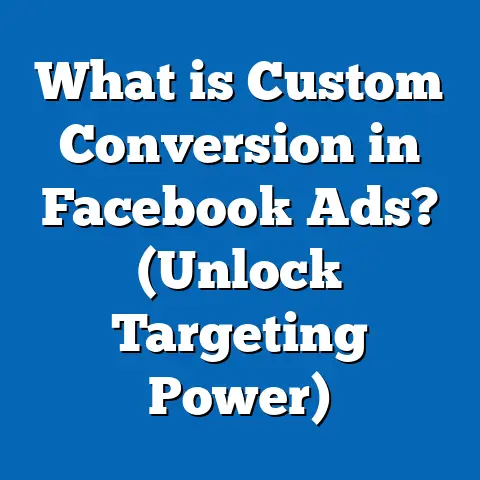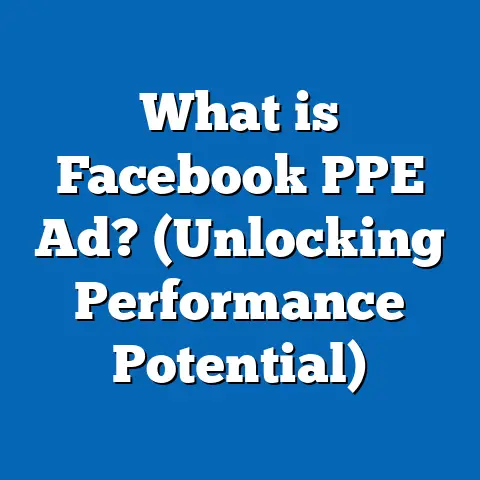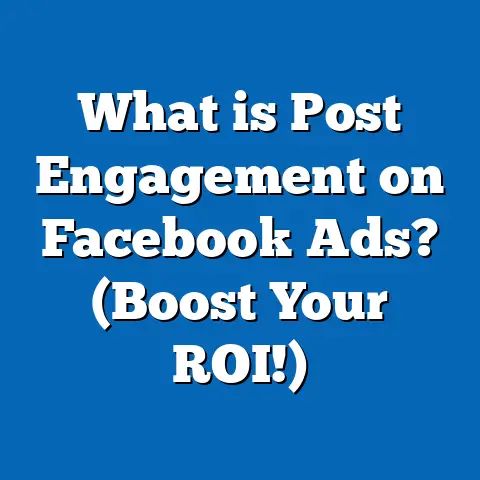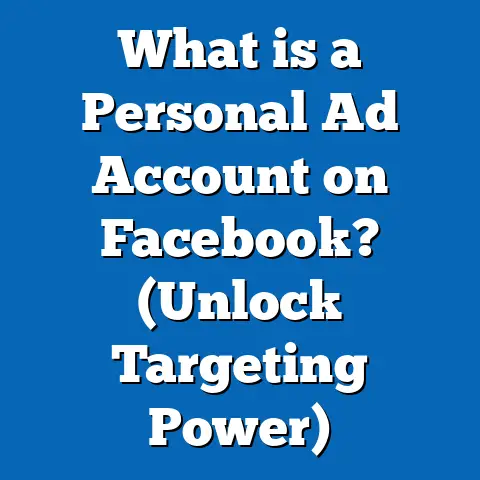What is Facebook’s Political Ad Collector? (Uncover Secrets)
Introduction
Did you know that over 220 million people in the U.S. receive some form of political advertising on Facebook each election cycle? This staggering number highlights the immense role Facebook plays in shaping public opinion and political discourse. With billions of users worldwide, Facebook has become a central platform for political campaigns to reach voters through highly targeted ads. However, this power also brings serious concerns about transparency, misinformation, and foreign interference.
In response to these challenges, Facebook introduced the Political Ad Collector—a tool aimed at increasing transparency in political advertising. This tool helps researchers, watchdog groups, and the public understand who is funding political ads, how much money is spent, and who is being targeted. For marketers, business owners, and political strategists, understanding this tool is crucial not only to comply with regulations but also to leverage insights for more ethical and effective campaigns.
What Is Facebook’s Political Ad Collector?
Definition and Purpose
Facebook’s Political Ad Collector is a crowdsourced tool designed to collect data about political advertisements on Facebook. It was developed as part of Facebook’s commitment to increase transparency around election-related ads that have the potential to influence democratic processes.
At its core, the Political Ad Collector allows users to:
- Automatically capture political ads they see on Facebook while browsing
- Share anonymized data about these ads with researchers and watchdog organizations
- Help compile an open database of political ads that provides transparency on ad sponsors and spending
The ultimate goal is to shed light on the who, what, and how of political advertising on a platform where billions of dollars are spent during election cycles.
Why Transparency in Political Ads Matters
Political advertising has traditionally been regulated by governments to ensure voters receive truthful information about candidates and policies. However, digital platforms like Facebook disrupted this model by enabling hyper-targeted ads with little disclosure.
Transparency is critical because:
- It helps voters evaluate who is behind political messages and whether they are trustworthy
- It exposes hidden funding sources, including foreign actors that may seek to interfere
- It allows regulators to enforce election laws and campaign finance rules effectively
- It builds public trust in digital platforms by holding advertisers accountable
Without tools like the Political Ad Collector, many political ads would remain invisible or unverifiable.
How Facebook’s Political Ad Collector Works
Data Collection Mechanism
The Political Ad Collector works through browser extensions or mobile apps that users voluntarily install. Once installed:
- The tool scans the user’s Facebook feed for ads that meet Facebook’s definition of political or issue-based ads.
- It automatically collects detailed information about these ads including:
- Full ad content (images, video clips, text)
- Sponsor information (who paid for the ad)
- Spending data (how much money was spent on the ad)
- Approximate targeting data (geography, demographics if available)
- This data is sent anonymously to researchers and watchdog groups who analyze patterns and identify problematic ads.
This crowdsourced approach allows a much larger sample of political ads to be collected than relying solely on Facebook’s internal systems.
The Role of the Facebook Ad Library
The Political Ad Collector feeds into the Facebook Ad Library, which is a public database launched by Facebook that archives all active and inactive political ads on its platform globally.
Key features of the Ad Library include:
- Searchable access to political ads by keyword, sponsor, or region
- Disclosure of spending ranges for each ad
- Information on when ads ran and their reach
By combining user-collected data with Facebook’s internal records, researchers gain a more complete picture of political ad campaigns.
Data Privacy Considerations
Facebook designed the Political Ad Collector with privacy in mind. Data collected:
- Does not include personal user information beyond what is publicly visible in the ad
- Is anonymized before being shared with third-party researchers
- Requires explicit user consent before installation and data collection begins
These safeguards help balance transparency with user privacy.
Political Advertising Trends on Facebook: Data & Insights
Explosive Growth in Political Ad Spend
Political ad spending on Facebook has skyrocketed over the last decade as campaigns recognize the platform’s targeting power. Consider these figures from U.S. federal elections:
| Election Year | Estimated Political Ad Spend on Facebook (USD) | Percentage Increase YoY |
|---|---|---|
| 2012 | $12 million | – |
| 2016 | $81 million | +575% |
| 2018 | $186 million | +129% |
| 2020 | $423 million | +127% |
This exponential growth reflects how digital platforms have transformed campaign strategies from traditional TV and radio to social media.
Regional Differences in Political Ads
Facebook’s global reach means political ad trends vary sharply by country:
- United States: Largest spender; heavy focus on presidential and congressional races.
- India: Increasing use during state and national elections; strong regional targeting.
- Brazil: High volume of issue-based campaigns around social justice and corruption.
Understanding these regional nuances is vital for multinational marketers or observers.
Targeting Strategies Revealed by Research
Analysis of data collected through the Political Ad Collector shows campaigns use diverse targeting tactics:
- Geographic targeting focusing on swing states or districts in U.S. elections
- Demographic targeting based on age, gender, ethnicity
- Interest-based targeting around topics like gun rights, immigration, or healthcare
These microtargeting approaches allow advertisers to tailor messages deeply but also raise ethical questions about voter manipulation.
Breaking Down Key Concepts
What Exactly Counts as a “Political Ad”?
Facebook’s definition includes any paid content related to:
- Elections or candidates running for office
- Political parties or advocacy groups
- Public policy debates on issues like climate change or taxation
- Social issues that have political implications
This broad scope ensures most content influencing voters is covered but also sometimes leads to gray areas around issue vs. commercial advertising.
Understanding “Issue-Based” Ads
Issue-based ads are those that do not promote a candidate but focus on topics that are politically charged. For example:
- Ads advocating for climate action without endorsing a candidate
- Campaigns about gun control legislation
These ads are also subject to transparency rules because they can influence voter behavior indirectly.
How Microtargeting Works
Microtargeting uses data points like:
- Location (zip code, city)
- Age group and gender
- Online behavior and interests (pages liked, groups joined)
Advertisers use this data to deliver highly customized messages designed to resonate emotionally or ideologically with narrow audience segments.
Case Studies: Real World Impact of the Political Ad Collector
Case Study 1: Uncovering Foreign Interference in 2020 U.S. Elections
During the 2020 election cycle, researchers using the Political Ad Collector identified suspicious patterns:
- Multiple ads with divisive messaging linked to accounts traced back to foreign entities in Russia and Iran.
- These ads targeted swing states with polarizing content aimed at suppressing voter turnout among specific demographics.
Facebook removed many such accounts after being alerted by researchers working with Political Ad Collector data. This case demonstrated how crowdsourced monitoring can supplement platform enforcement.
Case Study 2: Analyzing Microtargeting in a Senate Race
A political consultancy used data from the Collector to study their opponent’s ad strategy in a tight Senate race:
- Found heavy spending on targeted ads in suburban areas focusing on healthcare anxiety among women aged 35–50.
- Discovered competitor running different messages for urban vs. rural segments based on local concerns.
This insight helped refine their campaign messaging for maximum resonance and cost-efficiency.
Case Study 3: Tracking Issue-Based Campaigns in Brazil
In Brazil’s 2022 general elections, civil society groups used the Political Ad Collector to monitor issue-based ads promoting environmental policies:
- Identified hundreds of ads advocating Amazon rainforest protections sponsored by NGOs versus corporate-backed groups opposing regulations.
- Provided transparency that helped voters distinguish authentic advocacy from paid influence campaigns.
Comparing Facebook’s Political Ad Collector With Other Platforms
Digital platforms have responded differently to demands for political ad transparency:
| Feature | Facebook Political Ad Collector | Google Transparency Report | Twitter Political Ads Archive | YouTube Ads Transparency |
|---|---|---|---|---|
| Data Collection Method | Crowdsourced via user-installed extensions | Platform-provided ad data | Platform-provided ad data | Platform-provided ad data |
| Scope | Facebook & Instagram political ads | Google search & YouTube ads | Twitter political & issue ads | YouTube political & issue ads |
| User Participation Required | Yes | No | No | No |
| Public Accessibility | Yes (via Facebook Ad Library) | Yes | Yes | Yes |
| Targeting Data Visibility | Partial (from crowdsourcing) | Limited | Limited | Limited |
| Granularity of Spend Data | Spending ranges | Exact spend | Spending ranges | Spending ranges |
Facebook’s approach stands out because it supplements platform data with crowdsourced user contributions—providing richer insights but also relying on public cooperation.
Practical Applications for Marketers and Business Owners
Monitoring Competitor Campaigns
Political marketers can use insights from the Political Ad Collector to:
- Track competitor messaging strategies in real-time
- Identify which demographic segments are receiving targeted messages
- Analyze competitor spend patterns for budgeting intelligence
For example, a campaign manager might discover their rival heavily targets young urban voters with climate crisis messaging, prompting an adjustment in their own outreach.
Protecting Brand Reputation
Businesses advertising on Facebook during politically charged periods need awareness of surrounding political ads because:
- They risk association with controversial content if their ads appear alongside divisive political messaging
- Understanding political ad trends helps avoid perceived endorsements or backlash
Marketers should regularly monitor political ad activity near their industry or geographic area.
Leveraging Transparency for Consumer Trust
Brands supporting social causes can highlight their commitment to transparency by:
- Using tools like the Political Ad Collector to audit their own issue-based campaigns
- Sharing transparent reports about their ad sponsorship and budgets publicly
This builds goodwill among socially conscious consumers increasingly wary of fake news and hidden agendas.
Compliance With Regulations
Many countries now require disclosure of political ad funding sources. Using insights from transparency tools helps businesses:
- Ensure they meet legal disclosure requirements
- Avoid penalties or platform restrictions due to non-compliance
Exploring Advanced Details & Technical Aspects
How Ads Are Classified as “Political” By Facebook’s Algorithms
Facebook uses machine learning models trained on thousands of labeled samples to identify political content based on keywords, images, URLs linked within ads, and advertiser declarations.
However, this system sometimes misclassifies:
- Commercial ads discussing social issues without politics (e.g., environmental product ads)
- Issue-based advocacy campaigns run by nonprofits
Understanding this classification helps marketers anticipate which ads require additional disclosures.
Challenges With Data Completeness and Accuracy
Because the Political Ad Collector relies partly on user contributions:
- The dataset may have sampling bias based on who installs the tool (geography, demographics)
- Some targeting data remains opaque due to Facebook’s privacy policies
- Spending figures are often provided in ranges rather than exact amounts
Despite imperfections, it remains one of the most comprehensive sources available for independent study.
Role of APIs in Data Extraction
The underlying technical infrastructure uses APIs (Application Programming Interfaces) that allow external apps to request information from Facebook’s servers about active ads. The Political Ad Collector app interacts with these APIs while respecting privacy constraints.
Policy Implications & Industry Regulation
Government Actions Post-2016 Election Scandal
After revelations about foreign interference using social media:
- The U.S. Congress held hearings with Facebook executives demanding stricter controls
- The EU introduced GDPR provisions affecting political ad targeting
- Australia passed laws requiring platforms to keep detailed ad records accessible to regulators
The Political Ad Collector supports compliance by providing verifiable data trails.
Calls for Greater Transparency vs. Free Speech Concerns
While transparency advocates push for full disclosure of political ad funding:
- Critics argue excessive regulation could chill legitimate free speech online
- Platforms balance between user privacy rights and public accountability
Understanding these tensions helps marketers navigate ethical boundaries effectively.
Future Outlook: What Lies Ahead for Political Advertising Transparency?
Emerging Technologies Shaping Transparency
Artificial intelligence will play an increasing role in real-time detection of misleading political ads before they spread widely.
Blockchain technology is being explored as a way to create immutable records of ad sponsorships.
Potential Expansion Beyond Facebook
Similar crowdsourced transparency initiatives may emerge for platforms like TikTok or Snapchat as their role in politics grows.
Increasing User Empowerment Features
Users may soon gain more granular controls over which political ads they see or block entirely—changing advertiser strategies accordingly.
Summary & Clear Takeaways
- Facebook’s Political Ad Collector is a unique crowdsourced tool enhancing transparency in political advertising by collecting detailed ad data from users’ feeds.
- Transparency is critical for combating misinformation, exposing foreign interference, and enforcing regulatory compliance.
- Political ad spending on Facebook continues growing rapidly, making tools like this essential for accountability.
- Marketers can leverage insights from this tool to monitor competitors, protect brand reputation, and refine targeting strategies ethically.
- Challenges remain, including incomplete targeting data and classification errors—but ongoing improvements promise better accuracy.
- Regulatory scrutiny will intensify globally, making transparency tools vital for navigating evolving legal landscapes.
- Future developments like AI-driven monitoring and blockchain may revolutionize how political ad transparency is managed across platforms.
Additional Resources & Tools
To further explore Facebook’s political advertising landscape consider these resources:
- Facebook Ad Library – Searchable database of all active/inactive political ads.
- ProPublica’s Political Ads Collection – Independent archive using crowdsourced data.
- Google Transparency Report – Comparable insights into Google’s political ad ecosystem.
Closing Thoughts
Facebook’s Political Ad Collector represents a significant step toward greater openness in digital politics—a critical need as social media becomes an indispensable battleground for ideas and influence worldwide. By understanding how this tool works and what it reveals about modern political advertising, marketers and business owners can better navigate risks while harnessing new opportunities responsibly.
In an era where information can shape elections overnight, transparency tools like this serve as vital checks ensuring democracy remains resilient against manipulation in the digital age.






